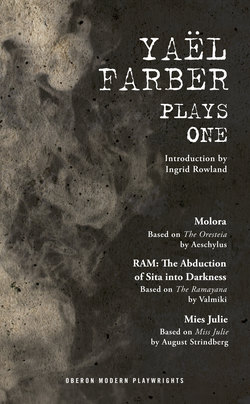Читать книгу Farber Plays One - Yaël Farber - Страница 9
На сайте Литреса книга снята с продажи.
ОглавлениеThe Ngqoko Cultural Group
The Chorus Reinvented
The Ngqoko Cultural Group is a body of men and women committed to the indigenous music, songs and traditions of the rural Xhosa communities. Hailing from the humble rural town of Lady Frere in South Africa, the group was first formed in 1980. A single bow player and her daughter were maintaining the practice of playing music together, when a German visitor, Dawie Dargie, began working with the Xhosa musicians with the help of Tsolwana Mpayipheli as translator. In 1983 Mpayipheli, or ‘Teacher’ as he is respectfully known, discovered several other musicians who joined the group. They have since established a reputation as guardians of the rural Xhosa culture, maintaining the survival and presence of indigenous South African music and instruments.
In Molora the device of the ancient Greek Chorus is radically reinvented in the form of a deeply traditional, rural Xhosa aesthetic. Farber chose to collaborate with The Ngqoko Cultural Group with the intention of rediscovering the original power of the device of the Chorus in ancient Greek theatre. In her quest to find a group that could represent the weight and conscience of the community – as she believes is the Chorus’ purpose – she happened upon the unearthly sound of the Ngqoko Group’s UMNGQOKOLO (Split-Tone Singing).
Farber drove out to the rural Transkei to meet with the women, where she told them the story of the Oresteia. The reaction to the story was deeply felt and met with much discussion on the moral implication of killing your own mother. Farber instantly knew she had found the Chorus to this new Oresteia.
Trained in this ancient art of singing, these women have been taught from an early age, the skill of creating this vocal phenomenon, as well as being masters of the ancient musical instruments that are an intrinsic part of their everyday lives in the rural Transkei. The mouth bows, calabash bows, mouth harps and milking drums form an array of traditional musical instruments that they – as Chorus – play in accompaniment to the text of Molora. The sounds of these unique Xhosa artists lend a haunting texture of sound, which is unfamiliar to most modern ears, and evokes a deeply emotional accompaniment to the work.
The envisaging of the Chorus as a group of ‘ordinary’ African women provides the context of the Truth Commission, which witnessed thousands of such ‘ordinary’ folk gathering in halls across South Africa to hear the details of a loved one’s death at the hands of the State.
The individuals that constitute The Ngqoko Cultural Group represent, in this context, the unique grace and dignity that was evident in the common man who chose a different path for South Africa. Within the Ngqoko group are two spiritual diviners who are trained in the channelling of ancestral powers. While these women are restrained in their use of authentic trance on stage, their authority in spiritual conduct allows a moment in which the audience may experience a deep participation in a prayer to our ancestors for an end to the cycle of violence in South Africa – and indeed the world.
